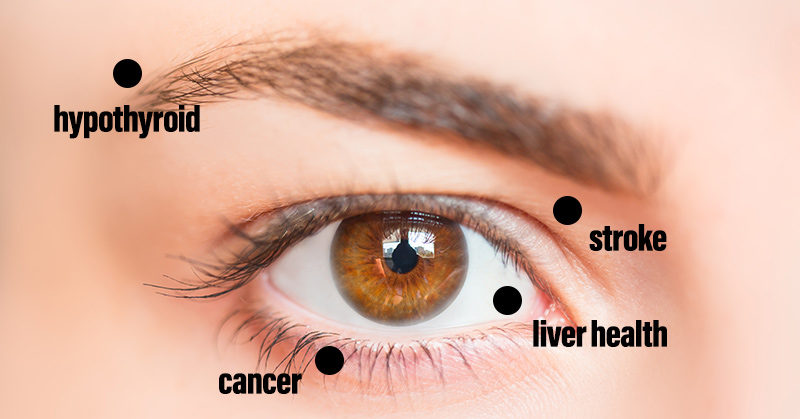The eyes can communicate a lot to us. They can convey emotions to others, and sometimes even indicate what someone else might be thinking. There is also a strong connection between our eyes and health.
More specifically, if the look or feel of your eyes changes, or if you begin to experience vision problems, this could be an indication that something else is wrong.
The Connection Between Eyes and Health
Changes in your eyes could be a sign of an underlying health condition that needs attention. If you notice any of the following changes (or anything else abnormal) in your eyes, be sure to seek out medical attention right away.
1. A Stye That Won’t Go Away
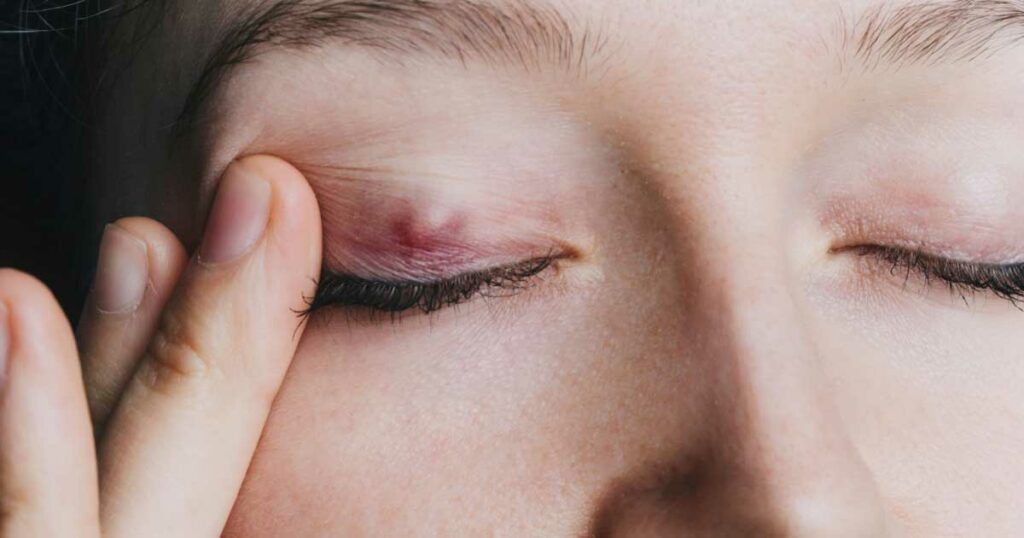
A stye is a small bump similar to a pimple that forms on or in the lower or upper eyelid. It is also known as a hordeolum. When the oil glands in your eye become infected, it can result in a stye. The bacterium staphylococcus is the most common culprit, but a gland can also be blocked by a foreign substance like makeup or dust [1].
Most styes should start to improve after about 48 hours. If you experience a stubborn stye that won’t go away, you should see your doctor. It could be a sign of a more serious infection or of a rare form of cancer called sebaceous gland carcinoma [2].
2. Your Eyebrows are Thinning
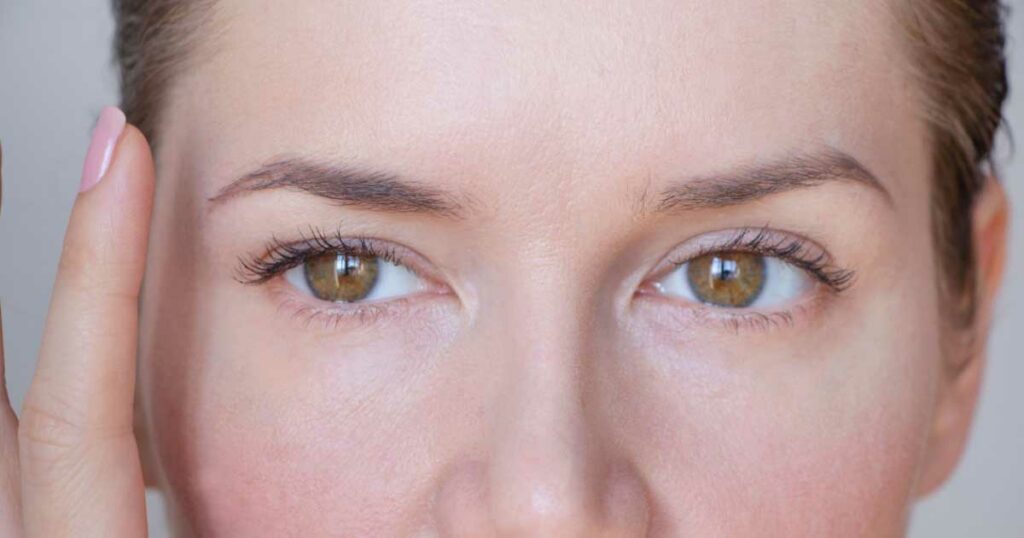
Not only is there a connection between your eyes and health, but also your eyebrows. Thinning eyebrow hair could be a sign of a number of things, including aging, stress, or a nutritional deficiency.
That being said, thinning eyebrows may also be a symptom of either type of thyroid disease:
- Hyperthyroidism: when your body creates too much thyroid hormone.
- Hypothyroidism: when your body does not create enough thyroid hormone.
Both types of thyroid disease can cause eyebrow hair loss. In particular, people with hypothyroidism may experience hair loss in the outer third of the eye brow. Luckily, this type of hair loss is usually temporary, and your hair should grow back once your thyroid hormone levels return to normal.
Other symptoms of thyroid disease are:
- Dry, pale skin or moist, velvety skin
- swelling in the neck (a goiter)
- coarse, dry, and brittle hair
- a dry, itchy scalp
- thick, dry, brittle nails [3].
3. Blurry Vision

If you work at a computer all day (or stare at your phone a lot) and your vision is starting to get blurry, you could be experiencing computer vision syndrome (CVS).
Also known as digital eye strain, CVS is a modern problem when it comes to eyes and health. This syndrome describes a group of eye and vision-related problems that occur when you stare at a computer, phone, or tablet screen for prolonged periods of time.
Other symptoms of CVS include:
- Eyestrain.
- Headaches.
- Dry eyes.
- Neck and shoulder pain.
If you are experiencing CVS, you should speak with your doctor or optometrist. They will be able to help you find a solution to the problem, that might include wearing special glasses or a vision therapy program [4].
Read: 5 Signs That Reveal You Live Longer Than Other People Your Age
4. Blind Spots
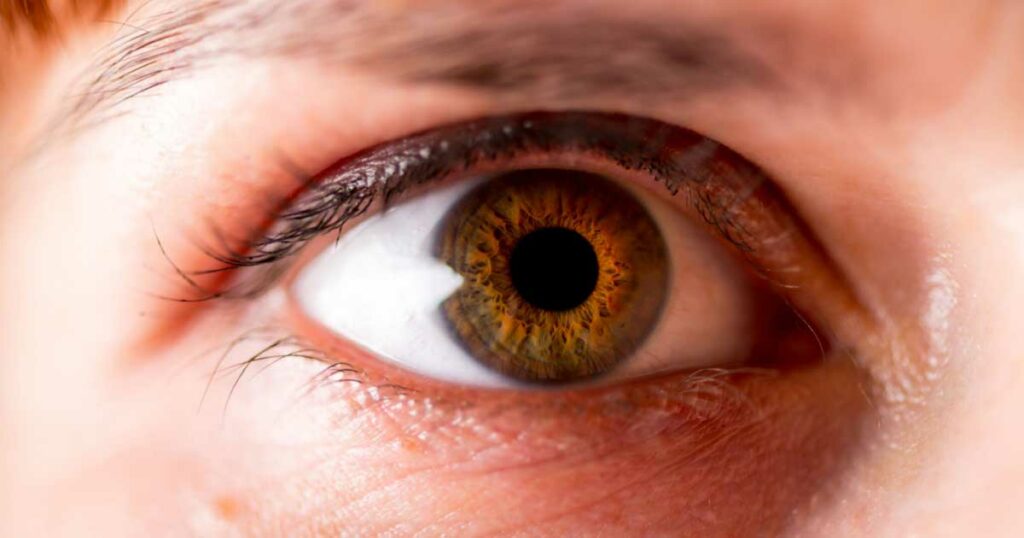
If you are seeing a small blind spot in your vision that is accompanied by shimmering lights or a wavy line, this could be a migraine aura. An aura is a series of sensory disturbances that occur shortly before a migraine attack.
Symptoms of a migraine aura might include:
- Vision Disturbances: Seeing spots, flashes, zig zags, stars, or even losing sight for short periods of time.
- Sensory Changes: Feeling tingling or numbness in the face, body, hands, and fingers.
- Speech or Language Problems: Unable to produce the right words, slurring or mumbling words.
A doctor will be able to help you find ways to deal with these symptoms, and even determine what triggers them so you can avoid them in the first place [5].
5. Your Eyes are Bulging
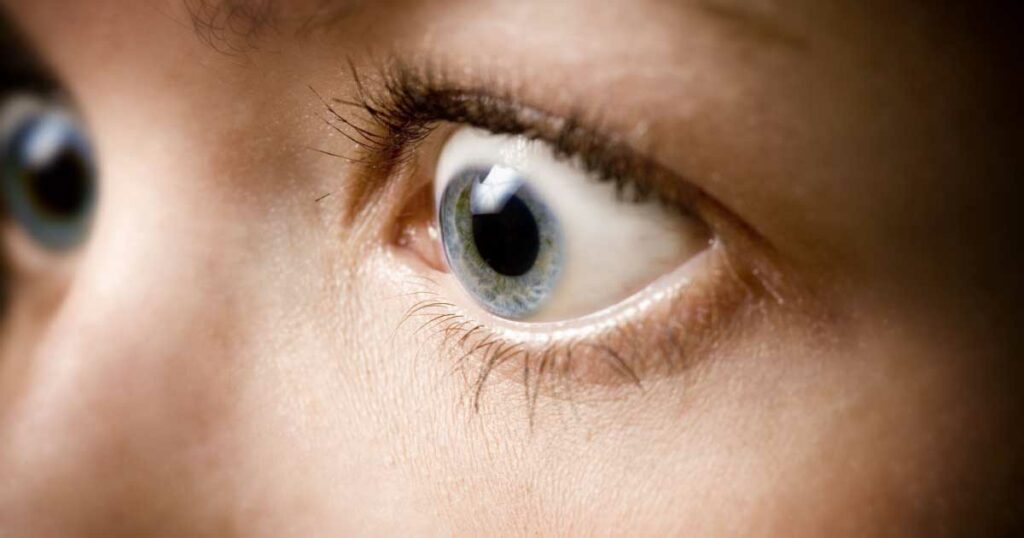
A consistent bulging sensation in your eyes may be another symptom of a thyroid issue. Hyperthyroidism is one of the most common causes of bulging eyes. Hyperthyroidism is also known as Grave’s Disease, and grave’s ophthalmopathy is one of the symptoms.
Grave’s ophthalmopathy is when your eyes appear enlarged and your eyelids retract. This causes them to bulge from your eye sockets [6].
If you notice your eyes bulging, you should speak with your doctor. They will determine if hyperthyroidism is the cause, and create a treatment plan for you.
6. The Whites of Your Eye Turn Yellow
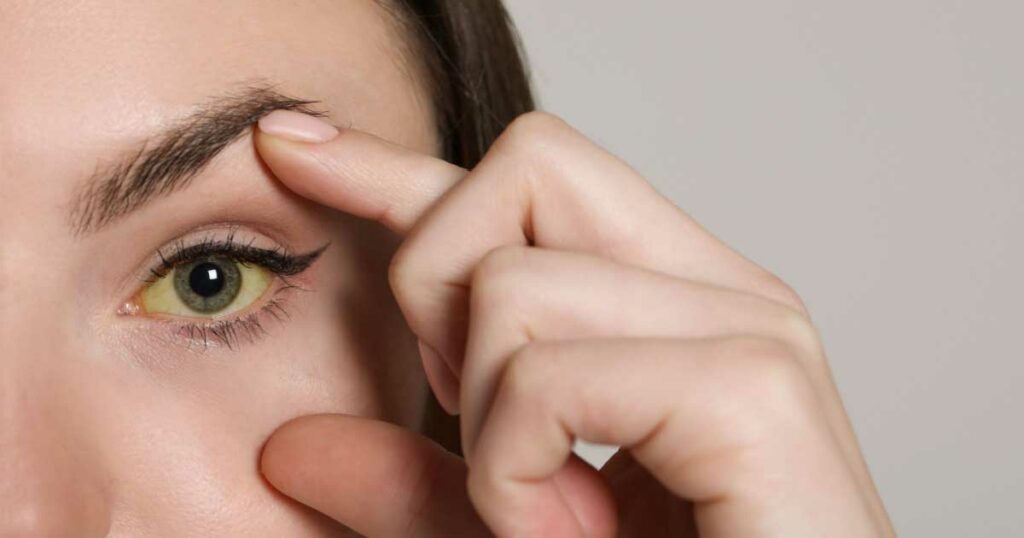
Jaundice is a condition in which the skin, whites of the eyes, and mucous membranes turn yellow. This is due to a high level of bilirubin, a bile pigment that is yellow-orange in color. Jaundice can be caused by a problem before, during, or after bilirubin production. It can be an indication of impaired liver health.
Before: this is called unconjugated jaundice and may be a result of:
- Your body reabsorbing a large hematoma (a collection of clotted or partially clotted blood under the skin).
- Hemolytic anemias (blood cells are destroyed and removed from the bloodstream before their normal lifespan is over).
During: this can be a result of:
- Viruses, including Hepatitis A, chronic Hepatitis B and C, and Epstein-Barr virus infection (infectious mononucleosis).
- Alcohol.
- Autoimmune disorders.
- Rare genetic metabolic defects.
- Medicines, including acetaminophen toxicity, penicillins, oral contraceptives, chlorpromazine (Thorazine®) and estrogenic or anabolic steroids.
After: this can occur when the bile ducts are blocked due to:
- Gallstones.
- Inflammation (swelling) of the gallbladder.
- Gallbladder cancer.
- Pancreatic tumor.
Jaundice is a more serious problem for infants. Adults don’t usually require treatment. That being said, if your eyes are yellowing, you should still speak with your doctor to make sure there isn’t something more serious going on [7].
Read: Sugar, Not Fat, is More Responsible for Heart Attacks
7. You Have Diabetes and Blurred Vision

Diabetic retinopathy occurs when the blood vessels in your retina are damaged. Initially, this condition may only cause mild vision problems, but it can lead to blindness. It can occur in anyone who has type 1 or type 2 diabetes. The longer you leave your blood sugar uncontrolled, the more likely you are to develop diabetic retinopathy.
Symptoms of the condition may include:
- Spots or dark strings floating in your vision (floaters)
- Blurred vision
- Fluctuating vision
- Impaired color vision
- Dark or empty areas in your vision
- Vision loss
This could be a very serious condition, so if you have diabetes and are experiencing blurred vision, talk to your doctor right away [8].
8. Double Vision, Dim Vision, or Vision Loss

All of these symptoms could be a sign of a ministroke. A ministroke is also known as a transient ischemic attack (TIA). A TIA occurs when part of the brain experiences a lack of blood flow.
Ministrokes do not cause permanent damage or disability. Their symptoms, however, are nearly identical to those of a stroke, so if you experience them you should talk to your doctor immediately.
Signs of a ministroke may include:
- dysphasia, a language disorder
- dysarthria, or physical difficulty when speaking
- vision changes
- confusion
- balance issues
- tingling
- an altered level of consciousness
- dizziness
- passing out
- severe headache
- an abnormal sense of taste
- an abnormal sense of smell
- weakness or numbness on just the right or left side of the face or body, determined by the location of the blood clot in the brain [9]
For Your Eyes and Health, Pay Attention
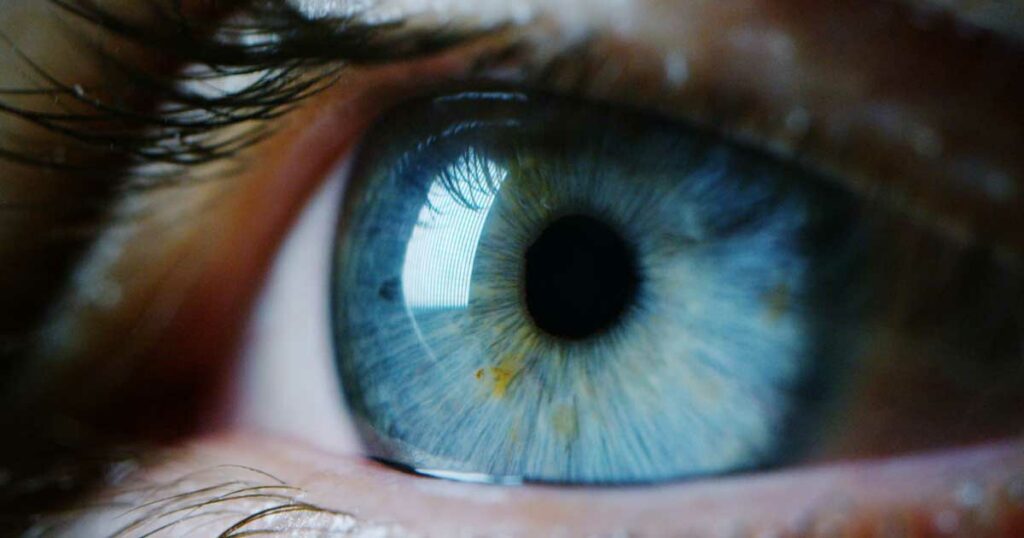
You know your body better than anyone else, and so should be able to tell when something is wrong. Your eyes and health are deeply connected, so if you notice any changes in the ebay they look or feel, or if you start to experience vision problems, you should talk to your doctor right away.
Keep Reading: 10 Ways Your Body May Be Telling You Something’s Wrong
Sources
- https://www.mayoclinic.org/diseases-conditions/sty/symptoms-causes/syc-20378017
- https://emedicine.medscape.com/article/1213781-overview
- https://www.medicalnewstoday.com/articles/325416#:~:text=Both%20types%20of%20thyroid%20imbalance,skin%20or%20moist%2C%20velvety%20skin
- https://www.aoa.org/healthy-eyes/eye-and-vision-conditions/computer-vision-syndrome?sso=y
- https://americanmigrainefoundation.org/resource-library/understanding-migraine-aura/
- https://www.healthline.com/health/graves-disease
- https://my.clevelandclinic.org/health/diseases/15367-adult-jaundice
- https://www.mayoclinic.org/diseases-conditions/diabetic-retinopathy/symptoms-causes/syc-20371611
- https://www.healthline.com/health/stroke/signs-symptoms-tia-mini-stroke#symptoms
